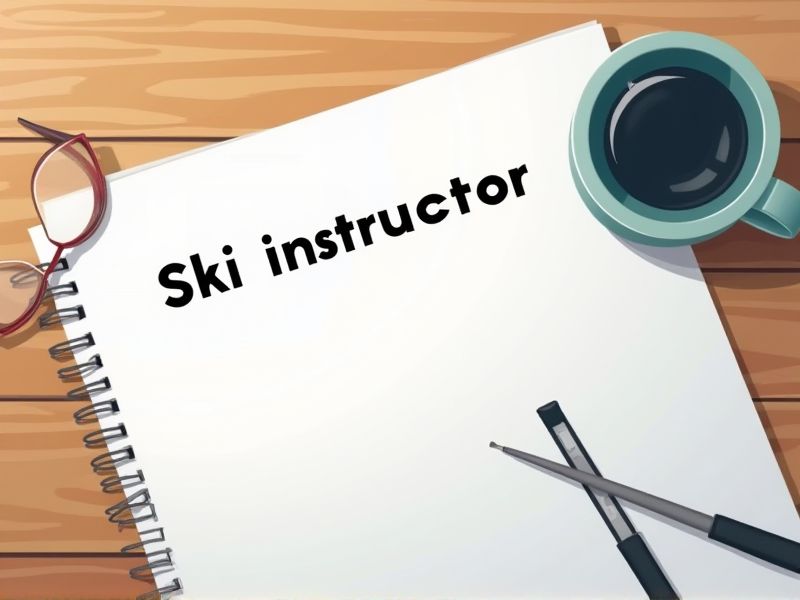
Ski instructors must possess specific certifications to ensure safe and knowledgeable guidance for learners on the slopes. These certifications validate the instructor's technical skills, teaching abilities, and comprehensive understanding of mountain safety. They also protect ski schools from liability by ensuring staff meets industry standards. Some important certifications you may need for a ski instructor career include Level 1, 2, and 3 PSIA/AASI certifications.
PSIA Level 1 Ski Instructor Certification
Achieving the PSIA Level 1 Ski Instructor Certification ensures fundamental skills in teaching skiing techniques, which enhances the instruction quality. The certification provides instructors with a standard evaluation, establishing a baseline of competency recognized by ski schools. Ski areas often require this certification to ensure consistency and safety standards in their programs. It also offers instructors opportunities for career advancement and access to a wider range of teaching positions.
CSIA Level 1 Certification
CSIA Level 1 Certification enhances a ski instructor's credibility and demonstrates foundational proficiency in teaching skiing. This certification ensures the instructor understands essential safety protocols and skiing techniques, crucial for effectively managing a range of beginner students. It provides a structured path for professional development, allowing instructors to align with industry standards. Certified instructors often gain access to better employment opportunities in ski schools, where proficiency and recognized qualifications are valued.
ISIA Ski Instructor Accreditation
ISIA Ski Instructor Accreditation ensures a standardized level of teaching proficiency and safety across international ski schools. Instructors with this accreditation are recognized for their advanced skills and professional commitment, enhancing their employability in competitive snow sports markets. Accredited instructors are more adept at delivering effective lessons, which leads to improved learning experiences for students. Ski resorts prefer hiring ISIA-accredited instructors as it assures consistent quality and safety standards for their clientele.
American Association of Snowboard Instructors (AASI) Certification
AASI Certification provides ski instructors with an industry-recognized standard of teaching proficiency, ensuring they possess the skills necessary to effectively coach students. Possessing this certification often leads to increased job opportunities and higher pay, as it signals a commitment to professional development. Instructors with AASI credentials demonstrate a comprehensive understanding of safety protocols, which is crucial in minimizing accidents on the slopes. The certification process enhances an instructor's ability to adapt teaching methods to varying skill levels and learning styles, improving overall student satisfaction.
CPR Certification
Ski instructors often find themselves in remote and mountainous locations where medical assistance may be delayed. CPR certification ensures they are equipped to handle cardiac emergencies promptly, which can be life-saving. Accidents on the slopes can sometimes lead to situations that require immediate CPR intervention, emphasizing the importance of certified personnel. CPR knowledge boosts the confidence of skiers and their families, knowing that instructors are prepared to manage critical medical emergencies.
First Aid Certification
Ski instructors encounter situations where immediate medical response is necessary due to the high risk of injuries in skiing. A First Aid Certification equips instructors with the skills needed to stabilize injured individuals until professional medical help arrives, reducing potential complications. Having such certification can enhance the safety reputation of a ski resort, potentially attracting more visitors. Proper first aid training may also decrease liability concerns for resorts by ensuring instructors respond appropriately to accidents.
Avalanche Level 1 Certification
Avalanche Level 1 Certification equips ski instructors with essential skills to recognize, assess, and avoid potential avalanche hazards, significantly reducing the risk of accidents. This certification ensures instructors can confidently lead groups through backcountry terrain while prioritizing safety. Acquiring these skills fosters trust among clients and enhances the ski school's reputation for safety-conscious instruction. In regions prone to avalanches, having certified instructors becomes a crucial factor in operating responsibly and legally.
Wilderness First Responder Certification
Ski instructors often work in remote or challenging environments, increasing the likelihood of encountering medical emergencies where immediate professional medical help may not be readily available. The Wilderness First Responder Certification equips them with essential skills to manage and stabilize injuries, such as fractures or hypothermia, until advanced care is accessible. This certification enhances the safety and confidence of both instructors and their clients, fostering a more secure learning environment. In the competitive ski industry, having this certification can also differentiate an instructor, potentially leading to more job opportunities and client trust.
Mountain Rescue Certification
Mountain Rescue Certification equips ski instructors with essential skills to handle emergencies in rugged terrains, enhancing their ability to ensure the safety of their clients. When accidents occur in remote and challenging environments, ski instructors with this certification can quickly assess and respond, reducing the risk of severe injury or fatality. The certification process also educates instructors on navigation and survival techniques, which are crucial during unexpected weather changes or avalanches. Ski resorts and outdoor adventure companies value this certification as it demonstrates a commitment to preparedness and professionalism.
Snow Safety and Rescue Certification
Ski instructors work in environments where avalanches and other snow-related dangers can occur, necessitating knowledge in snow safety for minimizing risks. Certification equips instructors with the skills for assessing snowpack stability, crucial for preventing skiing accidents. Instructors trained in rescue techniques can provide immediate assistance in emergencies, improving survival outcomes. Certification enhances credibility and trust among clients who prioritize safety during ski lessons.
Summary
When you attain ski instructor certifications, your marketability increases, attracting more clients seeking qualified trainers. Certification often results in greater trust from clients and resorts, enhancing your professional reputation. Employability improves as many ski schools prefer or require certified instructors. Certification can also lead to better pay rates, acknowledging expertise and qualification.
